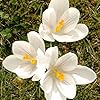Christine Rawlins
Goodreads Author
Born
East Yorkshire, The United Kingdom
Genre
Influences
Elizabeth Goudge
Member Since
September 2015
To ask
Christine Rawlins
questions,
please sign up.
Popular Answered Questions

|
Beyond the Snow: The Life and Faith of Elizabeth Goudge
—
published
2015
—
7 editions
|
|

|
A Vision of God
by
—
published
1990
|
|
* Note: these are all the books on Goodreads for this author. To add more, click here.
Christine’s Recent Updates
“Why do you call the people who don’t live in the Close the Lower Orders?” asked Hugh Anthony. “Grandfather calls them God’s Poor.” “Eh?” said the Dean, a little startled, and then he adjusted his eyeglass and rubbed his nose in a puzzled sort of way, as though he did not quite know how to answer. “I suppose,” said Hugh Anthony, “that Saint Hugh of Torminster belonged to the Lower Orders?” “Certainly not,” said the Dean indignantly. “The Blessed Saint Hugh was Abbot of Torminster. I hold – I say it in all humility – a position very like his own.” “Before he was Abbot of Torminster, he kept pigs,” said Hugh Anthony. “Like Mr. Burton, our butcher.” “Merely legendary pigs,” said the Dean. “And the Apostles were fishmongers,” continued the awful child, “like Mr. Robson in the Market Place… It’s a pity, isn’t it, that all the saints seem to belong to the Lower Orders?”
― Beyond the Snow: The Life and Faith of Elizabeth Goudge
― Beyond the Snow: The Life and Faith of Elizabeth Goudge
“Torminster in A City of Bells is Wells. If the houses in the Close, hidden behind their high walls, could be seen with the eyes of imagination as fortresses, the Palace was one in actual fact. Grey, battlemented walls, with loopholes for arrows, surrounded it and its gardens, completely hiding them from sight, and a wide moat, brimful of water, surrounded the walls. The portcullis was still there, and the drawbridge that linked this warlike island to the peace of Torminster. As they stood watching, the swans obligingly rounded the curve of the moat and sailed royally towards the drawbridge… The foremost swan…pulled with his beak the bell-rope that hung from the Palace wall. He rang it once, imperiously…and instantly a human menial showered bread from a window. This ringing of the bell was the superb accomplishment of the swans of Torminster, an accomplishment that had made them world-famous.36 Small wonder that Elizabeth said, linking her own childhood experience with that of Robert Louis Stevenson: Looking back from such a different world, through such a length of time, it seems that the sheltered happy childhoods of Victorian and Edwardian days had a very special magic.37”
― Beyond the Snow: The Life and Faith of Elizabeth Goudge
― Beyond the Snow: The Life and Faith of Elizabeth Goudge
“Naturally, her situation as an only child meant that there were times in her early years when she was lonely. Worse than this, however, in Elizabeth’s own harsh opinion of herself, was that her role as the only child of an invalid mother turned her into “a neurotic selfish little beast.”80 In my early years no one expected that my mother would live long. She herself was quite sure she would not, and like so many sensitive extroverts her own suffering caused her not only to be acutely aware of illness in others but even to imagine it was there when it was not. She considered me a delicate child who might not live long either… (Like Isaac in The Dean’s Watch perhaps, who “had always been a delicate and abnormally sensitive child, prone as the delicate are to seek a little comfort for himself here and there, and dangerously indulged by his equally delicate mother.”
― Beyond the Snow: The Life and Faith of Elizabeth Goudge
― Beyond the Snow: The Life and Faith of Elizabeth Goudge
“...the greater part or my spring happiness is due to the scent of the wet earth and young leaves.
I am always happy (out of doors be it understood, for indoors there are servants and furniture), but in quite different ways, and my spring happiness bears no resemblance to my summer or autumn happiness, though it is not more intense, and there were days last winter when I danced for sheer joy out in my frost-bound garden in spite of my years and children. But I did it behind a bush, having a due regard for the decencies.”
― Elizabeth and Her German Garden
I am always happy (out of doors be it understood, for indoors there are servants and furniture), but in quite different ways, and my spring happiness bears no resemblance to my summer or autumn happiness, though it is not more intense, and there were days last winter when I danced for sheer joy out in my frost-bound garden in spite of my years and children. But I did it behind a bush, having a due regard for the decencies.”
― Elizabeth and Her German Garden
“...as Parson Hawthyn says on receiving the gift of a book in The White Witch: "You give me great wealth, for the gift of a book is the gift of a human soul. Men put their souls in their books."
The soul in the books of Elizabeth Goudge reached out to readers worldwide and surely made of her, not merely a romantic novelist but one of the great Christian writers of the twentieth century.”
― Beyond the Snow: The Life and Faith of Elizabeth Goudge
The soul in the books of Elizabeth Goudge reached out to readers worldwide and surely made of her, not merely a romantic novelist but one of the great Christian writers of the twentieth century.”
― Beyond the Snow: The Life and Faith of Elizabeth Goudge
“...there is a constant theme at the centre of all her writings which forms the heart of her vision of God, From her earliest novel to the mature vision of her autobiography, the central importance of unity, reconciliation, one-ness, is reiterated; for she came increasingly to see everything in life, even the darkness of fear and pain and suffering, as part of the one perfect whole that is Creation, that tiny hazelnut of Dame Julian's vision that was all that is made.”
― A Vision of God
― A Vision of God
“...To search for colours, fumble for words,
Strive to catch in earthly song
The echo of greater music,
To fail with heartbreak and give
The heartbreaks to each other with our love,
Can this be why we live?”
― A Vision of God
Strive to catch in earthly song
The echo of greater music,
To fail with heartbreak and give
The heartbreaks to each other with our love,
Can this be why we live?”
― A Vision of God
“[He] looked exactly like Michael's idea of Don Quixote, 'the luminary and mirror of all knight-errantry', and for that gentle and melancholy knight Michael had always had the greatest affection. Indeed, he was almost his favourite character in literature . . . And he had been created by a man in prison . . . The thought of the great Cervantes, 'the maimed perfection', and of his sufferings so triumphantly endured, was one of the things that had helped to keep him sane many times, he imagined. He was young enough to believe that men go mad, that men die, more easily than in fact they do. He put the point where endurance is no longer possible at a reasonable distance along the way, not at that distant point where John could have told him that it does in fact exist.”
― The Rosemary Tree
― The Rosemary Tree














Mar 23, 2022 09:08AM · flag